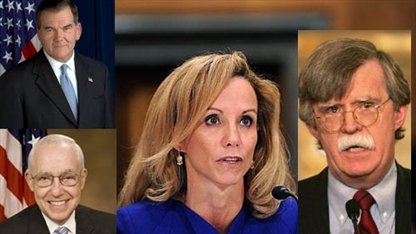Mario Lana, head of Italy’s Lawyers Union for Human Rights, in an article published on 29 April penned in support of the MKO refuted the crimes and allegations attributed to the organization claiming that “he who struggles for democracy, cannot be a terrorist”.
Mr. Lana’s comment can be regarded from both simplistic and realistic angles. Simplistic because, from a historical point of view, almost all political struggles, at least in their mottos and sketches of their political objectives, chanted democratic slogans and represented the paradigms of a democratic society as a requisite to encourage supporters and to recruit parties. Atop of all the currents dazzles the Left movement. History tells us that the outcome was the most atrocious model of dictatorship that ever fought under the banner of emancipating man from class and political totalitarian systems.
Stalinism evolved into one of the most influential liberation movements in half of the world. Contemporary world history recognizes Stalinism as a paradigm for all practiced forms of stabilizing an authoritarian party. It theorized and exercised imprisonment, execution, political assassination, terror, and … in many ideologically justifiable forms, not only against dissidents but also against insiders. In fact, the chief victims were the movement’s linchpins rather than the foes of democracy and freedom.
Stalin exiled Trotsky, who rose to power alongside Lenin after the Russian Revolution and was in charge of foreign affairs, and then had him assassinated because of his opposition to Lenin and Stalin, a line followed by most parties and currents that were inspired by Marxism or had faith in its strategy and ideology. The true expenses of Stalinism were exposed only after its fall; no one denies Stalin’s role as the most fervent patriot fighting against the Nazism invasion, yet, he is indisputably the most tyrannical dictator recorded in history. This paradox is the essence of a theorized ideology evolved with the wear of freedom and democracy. That is to say, the thought dealing with freedom and democracy emerged out of a counter-democratic ideology, a criterion to conduct the extent of internal and external violence. It is the ideology that legalizes the conduct and recognizes its innate terrorism as a blessed act; adherents become devotees of a cause constructed on pillars of freedom and democracy.
There is good historical evidence to prove Mr, Lana’s comment can be attributed as simplistic. The discrepancy between chanted mottos and the actual practice of democracy is a product of disapproving democracy itself. To bring off democracy, the mottos should tally with real practices. The Mojahedin’s past modus operandi depict clearly that the group had taken a wrong direction for the cause of democracy. The autocratic structure of its leadership has depreciated it to a kind of Stalinist dictatorship. Thus, how can the Mojahedin guarantee that it doesn’t adapt its claims of democracy for the practice of autocracy?
It is precisely correct to say that ‘those who struggle for democracy cannot be a terrorists’, because democracy absolutely discards any form of violence. The Mojahedin’s favoured democracy, if borrowed from the West, should be defined as “a system of government in which power is vested in the people, who rule either directly or through freely elected representatives”. Can the Mojahedin really tolerate such a system? That is to say, does the group respect dissidents, recognize peoples’ rights, and draw no limitation for its assumed democracy? Even now, far away from assuming any political power, the NCRI intimidates the critics and dissident parties.
Violence has been an innately distinguishable feature of the Mojahedin from the beginning. The key solution to accomplish its organizational and ideological achievements was through the practice of violence. It believes the Iranian peoples’ uprising in 1978 was a total failure because it lacked absolute bloodshed and violence. The Mojahedin’s ideology is in no way identifiable with democracy.
Mr. Lana’s comment is dearly accepted, but the Mojahedin’s past is a negation of its claims to be struggling for democracy. The mere claims fail to endorse the group wholeheartedly as pro-democrats and the Mojahedin has proved to be anti-democratic in practice. Mr. Lana’s comment can be paraphrased as “no terrorist struggles for democracy” and the Mojahedin, knowing this fact, seek legal excuses to justify its terrorist and violent acts by referring to them as “legitimate defence”.
Mr. Lana fails to remember that the Mojahedin is at the crossroads of a critical juncture and in need of applicable instruments to survive. That is why the group takes advantage of the anxieties, well-founded or groundless, sweeping over the West in order to legitimize its political being. The great challenge the world faces today is terrorism and the Mojahedin has to be dealt with in some way; it is clever enough to realize it is walking on the verge of a slippery slope.
In representing definitions of democracy, the Mojahedin oversteps those of the West. By drilling its exaggeratedly theorized democracy into the West, the group reminds the West that it has a rather more enormous capacity to overshoot the Western adopted democracy. At the same time, it has not the least respect for democracy so as to practice it, not even in its primitive form, inside the organization. Nowhere can you find so ruthless methods of brainwashing put into practice under the cover of democracy. Mr. Lana is under the illusion that the embrace of democracy by Mojahedin defies a terrorist nature. An unbiased, realistic look would explain everything.
Mr. Lana should be reminded that his refutation of terrorism changes nothing. The fact is that the Mojahedin is innately a terrorist group and its keeping hold of the democracy motto never washes its hands of its past crimes. Democracy is a no laughing matter and a terrorist group’s struggle under the clothing of democracy, is a viper in your bosom. The supporters of terrorism must keep in mind that they too share the blame if the terrorists betray their trust.
By Omid Pouya – 10 May 2006

